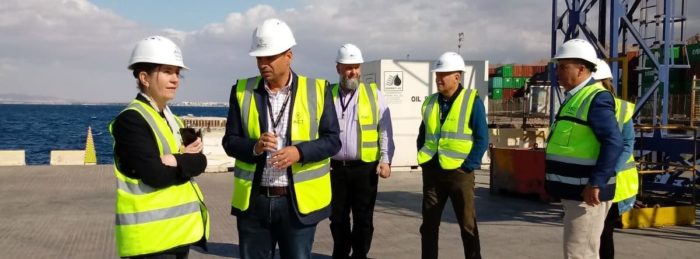ITF Seafarers’ Trust launched a new three stage occupational safety and health education program for port workers in Aqaba, Jordan.
Specifically, this program features an app based awareness raising component followed by face-to-face training and work place assignments- and is designed to increase worker participation in the OSH agenda, complementing company initiatives where they exist creating a safer environment for both dockers and seafarers visiting the ports.
ITF Regional Secretary, Bilal Malkawi noted the origin of this project came from the request to the Seafarers’ Trust for help with an ambulance in the port of Tunis which resulted in a serious discussion around cause and effect, adding that
We are convinced that this training program will go a long way towards educating workers to play a key role in prevention and ultimately reducing the number of accidents and tragic fatalities.
Katie Higginbottom, Head of the ITF Seafarers’ Trust stated that “occupational safety and health in the maritime sector is priority area for the Trust and we are delighted to be working with committed leaders in a region with enormous challenges. We have brought together a team with exceptional technical skills and experience and aim to have a dramatic and sustainable impact over time. This is a win-win for maritime workers and their employers.”
According to a recent statement, the training program will initially be rolled out in the ITF Arab World covering 31 ports in 12 countries, engaging with around 36 ITF affiliated dockers trade unions with the potential to reach some 60,000 workers.
The counties involved are Algeria, Bahrain, Egypt, Iraq, Jordan, Kuwait, Lebanon, Libya, Morocco, Oman, Tunisia and Yemen.
ITF Regional Chair Seddik Berrama commented that
Workers in this region are determined to improve their health and safety outcomes. This program will set them on a path of progress. Ports are inherently dangerous places. All workers deserve to come home to their families at the end of the shift. The Seafarers Trust health and safety program is a game changer for us.
In July, the UK maritime industry issued a joint notice, indicating that it would cooperate to take a leading stand in the fight against the illegal use of Dangerously Weighted Heaving Lines (DWHLs) in UK ports and harbours.
The notice highlighted what was expected of seafarers in the International and Domestic codes of the International Labour Organization (ILO) Code of Practice – Safety and Health in Ports and the Marine and Coastguard Agency’s (MCA) Code of Safe Working Practices, and cross-industry signatories call for ship-owners, ship-managers, ship’s agents, port operators and pilots to help in eliminating the use of DWHLs.






























































